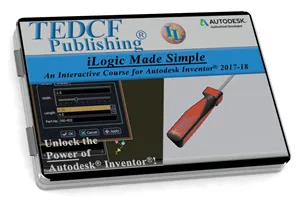iLogic creates parts, assemblies, and drawings with a click of a button. This course shows you how!
The Inventor 2017-2018: iLogic Made Simple course shows you how to create custom parts and assemblies with your own custom input dialog boxes. It's hard to imagine what you can't do with this impressive tool.
Sounds complicated? Not when you see how simple we've made it. You don't need to have a programming background to learn how iLogic works. With a little practice you can create custom assemblies with just a click of a button. We show you all the steps and we show you how to learn from what you've learned.
It may sound complicated, but when you watch the course you'll see that you can do it.
So is this a basic course? Not at all, it starts with the basics and builds to an extremely advanced level. By the time you're finished you'll know how to instantaneously create custom parts and assemblies as well as component and assembly drawings with just a click of a button.
What do you need to know before you use this course? You need to have a strong foundation of Inventor skills, which are taught in the first 6 courses of our Inventor training series. So if you watch the courses in the Ultimate Bundle you'll have all you'll need to learn and use iLogic.
68 Lessons & 67 Tips (Listed Below)
6.6 hours of instruction
You can also browse through the lessons from the following Inventor 2017-2018 courses and watch sample lessons.
Inventor 2017-2018: Solid Modeling Inventor 2017-2018: Assemblies and Advanced Concepts Inventor 2017-2018: 2D Drafting and Customization Inventor 2017-2018: Sheet Metal Design Inventor 2017-2018: Tube and Pipe Routed Systems Inventor 2017-2018: Inventor Studio Made Simple Inventor 2017-2018: iLogic Made Simple Inventor 2017-2018: Fea Made Simple Inventor 2017-2018: Dynamic Simulation Made SimpleOur Inventor courses require No Installation. You can watch them on any device connected to the internet.
You will receive an email containing your User Name and Password. Login to your account and start learning. It's that easy.
While you're logged into your account you can download files used in the courses, watch lessons, and practice the tasks taught in the lessons. Keep in mind that you will use your installation of Inventor to practice.
Get your Inventor 2017-2018 training now. You can start learning in minutes.
Autodesk Inventor® 2017-2018:
iLogic Made Simple
No Installation Required
Watch from any device connected to the internet.

$59.95 - $229.95
Watch Sample Lessons
Watch the first hour of the Solid Modeling course for Autodesk Inventor 2017-2018.
 Click to Watch!
Click to Watch!iLogic Made Simple
6.6 hours of instruction
Lessons
Introduction
ILMS-Tip-1
iLogic Parameters
ILMS-Tip-2
Preparing Parts for iLogic
ILMS-Tip-3
iLogic Rule Basics
ILMS-Tip-4
iLogic Suppression
ILMS-Tip-5
Reusing Code
ILMS-Tip-6
Strategy for Using iLogic
ILMS-Tip-7
Mastering Snippets
ILMS-Tip-8
iLogic Assemblies
ILMS-Tip-9
Linking Imported Parameters
ILMS-Tip-10
Troubleshooting Rules
ILMS-Tip-11
Working with String Parameters
ILMS-Tip-12
Mastering Case Statements
ILMS-Tip-13
Expanding Rule Functionality
ILMS-Tip-14
Nested Case Statements
ILMS-Tip-15
iLogic Forms
ILMS-Tip-16
Creating iLogic Forms
ILMS-Tip-17
Configuring Controls
ILMS-Tip-18
Filename Parameters
ILMS-Tip-19
Linking Filename Parameters
ILMS-Tip-20
Control Testing Strategies
ILMS-Tip-21
Automatically Save Files
ILMS-Tip-22
Point Assembly to Component Files
ILMS-Tip-23
Replacing Parts with iLogic
ILMS-Tip-24
Master Rules
ILMS-Tip-25
Algorithms
ILMS-Tip-26
Triggers
ILMS-Tip-27
Redundant Files
ILMS-Tip-28
Pre-Existing Files
ILMS-Tip-29
Building Descriptions and Titles
ILMS-Tip-30
Snippet Workflow
ILMS-Tip-31
Opening Excel Files
ILMS-Tip-32
While Loops
ILMS-Tip-33
Populating Excel Worksheets
ILMS-Tip-34
Updating Master Rules
ILMS-Tip-35
Multi-Line Messages
ILMS-Tip-36
Searching Tables
ILMS-Tip-37
Trick for Stopping Rules
ILMS-Tip-38
Preventing Duplicate Records
ILMS-Tip-39
Stopping Error Messages
ILMS-Tip-40
Updating Assembly Components
ILMS-Tip-41
Cleaning Up Your Code
ILMS-Tip-42
Building Assemblies and Testing
ILMS-Tip-43
Automating Mechanical Drawings
ILMS-Tip-44
Testing Rules on Drawings
ILMS-Tip-45
Control Section Cutting Lines
ILMS-Tip-46
Break Views and Detail Circles
ILMS-Tip-47
Automating Broken Views
ILMS-Tip-48
Broken View Rule Details
ILMS-Tip-49
Break Multiple Views
ILMS-Tip-50
Dimensions on Suppressed Features
ILMS-Tip-51
Determining Rule Placement
ILMS-Tip-52
Using Shared Variables
ILMS-Tip-53
Robust Shared Variables
ILMS-Tip-54
Testing Shared Variable Rules
ILMS-Tip-55
Running idw Rules from Assemblies
ILMS-Tip-56
Saving Drawing Files
ILMS-Tip-57
Change View File Reference
ILMS-Tip-58
Update Reference File
ILMS-Tip-59
Passing iProperties and Parameters
ILMS-Tip-60
Replacing Drawing References
ILMS-Tip-61
Assembly Drawing Rules
ILMS-Tip-62
Passing Assy to Drawings
ILMS-Tip-63
One Click Assy Parts & Drawings
ILMS-Tip-64
Creating Input List Radio Boxes
ILMS-Tip-65
External Rules
ILMS-Tip-66
Global Forms
ILMS-Tip-67
Conclusion
